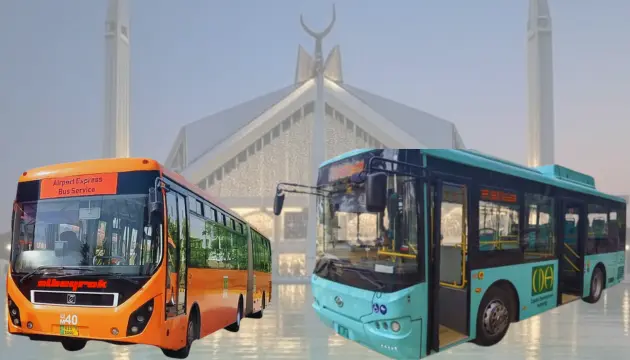ISLAMABAD: The fares of the metro bus service in the federal capital Islamabad have been increased.
According to a notification issued by the administration, the new fare policy will be implemented from May 26, 2025 (Wednesday), under which the fare per trip on the Orange, Green, Blue Lines, and Electric Feeder routes has been fixed at Rs 100.
Earlier, the fare was Rs 50 on most routes, while the fare for the Orange Line’s N-5 to Airport route was Rs 90. According to officials, the fare increase was inevitable in order to maintain the quality of service, due to rising fuel prices, operational costs, and the need to increase the fares.
The citizens of Islamabad and Rawalpindi had expressed happiness over the launch of the metro and electric bus services and hoped that this system would provide relief from the problems of expensive private transport and overloading.
However, the sudden 100 percent increase in fares became a source of inconvenience for the citizens, and a large number of passengers have rejected the decision. They say that this increase will burden low-income people and the facility will lose its usefulness.
Citizens have demanded that instead of increasing the flat fare, a phased fare system be introduced, in which fare is charged according to distance so that those traveling to nearby stops pay less.
Revised Fares for Islamabad Metro Bus Service Effective from 26 May 2025:
| Sr. | System | Route | Existing Fare (Rs.) | Revised Fare (Rs.) |
|---|---|---|---|---|
| 1 | Orange Line Metro Bus System | FAF to NS | 50 | 100 |
| NS to Airport | 90 | 100 | ||
| 2 | Green Line Feeder Route Service | PIMS to Bhara Kahu | 50 | 100 |
| 3 | Blue Line Feeder Route Service | PIMS to Gulberg Green | 50 | 100 |
| 4 | Electric Vehicle Feeder Service | Islamabad Feeder Routes | 50 | 100 |

Latest update:
According to fresh reports, the Capital Development Authority (CDA) has postponed the implementation of the increased fares for the Orange, Green, Blue Line Metro, and Electric Bus services in Islamabad.
Earlier, the CDA had issued a notification to increase the fare from Rs 50 to Rs 100 starting May 26. However, the decision has now been put on hold.
CDA sources say that Rs 50 fare does not cover operating costs, and the authority is currently providing a Rs 3 billion annual subsidy. CDA buses operate on 17 different routes in the city. The administration is now considering a phased fare increase instead of an immediate hike.
Another piece of news for the citizens of Islamabad is that a plan has been prepared to introduce an electric tram service under the modern public transport system in the federal capital.
This was confirmed by Chairman Capital Development Authority (CDA) Muhammad Ali Randhawa after a meeting with the National Radio Telecommunication Corporation (NRTC).
ALSO READ
Islamabad gets faster route to Murree with new underpass
Randhawa said that the feasibility study of this project has been approved on the instructions of the Prime Minister and the Interior Minister.
He said that “buses are already running; now we are moving towards electric trams.” The meeting also discussed “soft-wheel electric trams” and improvement of the existing electric feeder network.
The CDA has directed to complete the feasibility report soon so that tram services can be started on busy routes of the city at the earliest. The initial plan has proposed four routes, including Rawat to Faisal Masjid (via Expressway) and Jinnah Square to Islamabad Airport (via Srinagar Highway). A Chinese consultancy firm will be hired for this purpose.
Earlier, the CDA had launched 13 feeder electric bus routes across Islamabad, which is a major step towards an eco-friendly and affordable travel facility. Under the leadership of Chairman Randhawa, the CDA is actively working to reduce carbon emissions, improve air quality, and provide efficient transport facilities in the capital.
A recent high-level meeting expressed satisfaction over the successful operation of 120 electric buses, while 40 more buses will be added by June 2025. A complete charging infrastructure has also been set up at the H-9 bus depot.
ALSO READ
Islamabad approves theme park, Ferris wheel and cable car projects
The project is part of a strategy to connect feeder routes with the existing Bus Rapid Transit (BRT) network to provide seamless travel for commuters. The project also includes 216 new bus stops and four modern depots across the city.
The first batch of 30 electric buses, which will be operational in July 2024, is providing travel facilities to an average of 32,000 passengers daily. Chairman Randhawa said, “This is not just a plan to reduce pollution, but an attempt to establish a sustainable system where public transport is affordable, efficient, and environmentally friendly.”
The CDA’s vision does not end here, but in the future, there is also a plan to build a comprehensive master plan and a multimodal intercity bus terminal at I-11 in collaboration with the Asian Development Bank (ADB).










